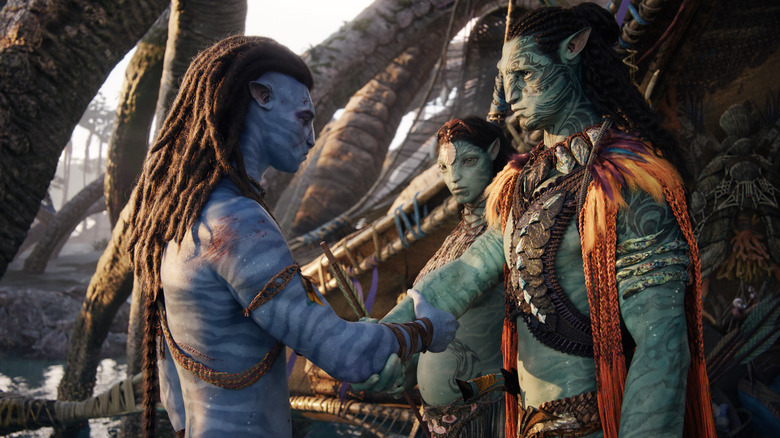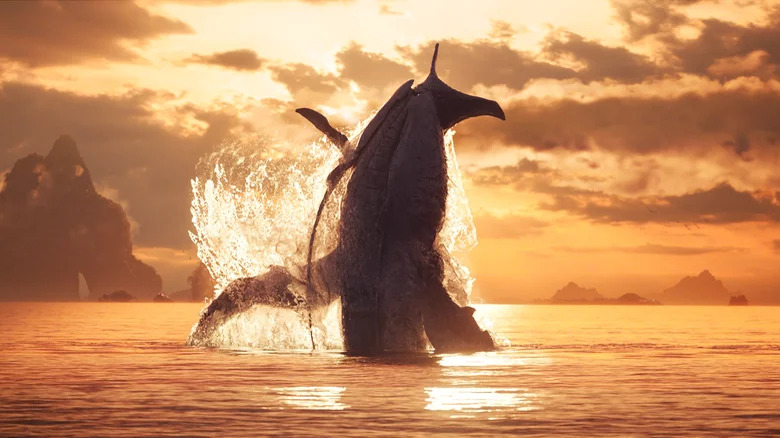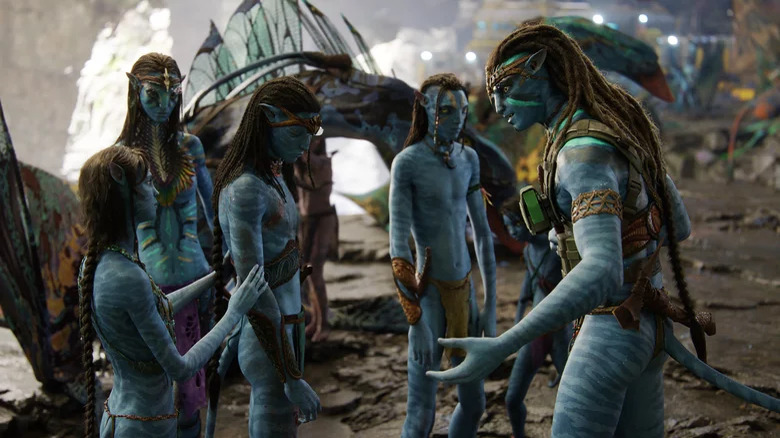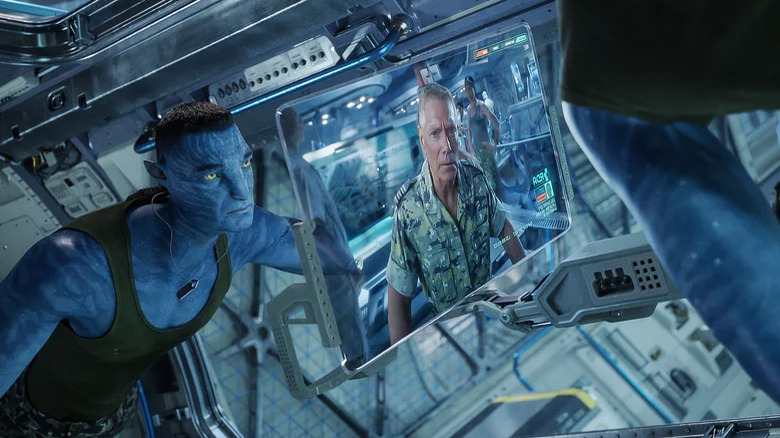Why The Rumored Avatar Sequel Plots Make Me Question The Future Of The Series
This post contains spoilers for "Avatar: The Way of Water."
The "Avatar" movies have had a huge impact, cultural and otherwise. When James Cameron's original "Avatar" came out in 2009, it made 3D cool again in a way that it hadn't been for decades and really pushed the envelope for motion-capture and digital effects. Cameron's sci-fi epic was so immersive that it even left some moviegoers feeling depressed that they didn't actually live on Pandora.
Sure, the story in "Avatar" is derivative and its characters are paper-thin, but they're not the focus of the film, they are vessels through which Cameron explores his outlandish visuals and bold ideas. Jake Sully doesn't matter as much as the idea of an avatar does. Likewise, the film is a daring modern blockbuster that portrays the U.S. military in a clear-cut villainous light. (Let's not forget, this is the same James Cameron who gave us an overtly anti-cop sci-fi film with "Terminator 2: Judgement Day.")
Despite their many problematic aspects, the "Avatar" movies are nevertheless giant, wildly expensive blockbusters all about how humans have destroyed the environment and deserve to be defeated by the native forces they deem inferior to them on Pandora. These are films that serve as an excuse for Cameron to pitch all his favorite environmental causes and charities to the widest audience possible.
This also makes recent comments from Cameron and his longtime producer Jon Landau about the planned plot of future "Avatar" sequels tonally incoherent with the movies we've already seen — and why I now find myself questioning the creative direction of a franchise I've fervently defended and admired for the past 13 years.
Clear moral lines
"Avatar: The Way of Water" is, in many ways, just a giant, massively expensive commercial for saving the oceans, a movie that introduces yet another Na'vi tribe and shows how connected they are with the environment while contrasting that with humanity's ruthless and cold destruction of nature. If the first movie was all about mining and stripping the Earth of its resources, then "The Way of Water" focuses on commercial whaling and how we've historically destroyed our oceans for vanity and greed.
By showing a rather specific and graphic whaling scene, "The Way of Water" guarantees that the audience will completely side with the Na'vi and cheer on the destruction of the human forces for their unredeemable sins. Granted, this isn't exactly ground-breaking storytelling for the sci-fi genre. Heck, the "Planet of the Apes" movies have been making audiences cheer against humanity since the late 1960s.
And yet, despite making not one but two "Avatar" movies about the cruelty of humanity and the way we destroy the Earth — with the only good humans being those that betray their kin and fight with the Na'vi — James Cameron seems to be in danger of throwing all that goodwill away.
In a recent interview, Cameron revealed his plan to introduce a Na'vi Fire Nation, which would only invite further comparisons between his films and that other "Avatar" franchise. Not only that, but he also wants these Na'vi to be the villains because, apparently, he's tired of portraying the Na'vi as being the good guys all the time. It's arguably a weird creative decisoin, but not necessarily one that clashes with the first two films. "The Way of Water" reveals that the Tulkun used to kill each other, so a Na'vi tribe fighting other Na'vi tribes wouldn't be out of place.
No subtext king
Now, however, producer Jon Landau has confirmed that the "Avatar" sequels will eventually visit Earth. It's a cool idea on its own, especially considering that the cut alternate opening scene for the original "Avatar" provided a brief glimpse at James Cameron's dystopian vision for our home planet's future.
The problem is what Cameron is planning to use the setting for. According to Landau, "In ['Avatar 5'] there is a section of the story where we go to Earth. And we go to it to open people's eyes, open Neytiri's eyes, to what exists on Earth."
That's right, Cameron is going to "both sides" one of the few modern properties that absolutely does not need it. The "Avatar" franchise has been problematic since the beginning, from its white savior narrative to casting a bunch of white actors to play characters that are clearly coded as people of color — but at least they do a lot of work to flesh out the Na'vi while making the humans suck. To move away from that in favor of a "There are good people on both sides" argument would be a huge mistake that removes what makes this franchise special.
After all, Cameron has never really been one for subtext. He is more like that Garth Marenghi meme from "Darkplace" about subtext being for cowards. To give shades of gray to the Na'vi/human conflict feels a little too late for a filmmaker who literally made a movie where the military industrial complex was personified as a metal cyborg with red eyes who lives in a nuclear wasteland and goes back in time to murder humanity's hope for the future before they can even be born. Cameron has never really done subtext, so why start now?
Don't be like Jurassic World Dominion
More than anything, introducing shades of gray to the morality of the "Avatar" franchise is wholly unnecessary. Both "Avatar" and "The Way of Water," but especially the former, have already featured human characters who cared about the Na'vi and didn't agree with the pillaging and the murdering favored by their peers. When push came to shove, they even fought directly against the other humans in the films!
Mind you, if this is specifically about showing Neytiri that not all humans are bad, well, has James Cameron forgotten that Neytiri is well-aware Jake Sully was born a human? Or that she knows (and presumably is at least friendly-ish with) humans like Norm Spellman and Max Patel, who work with and help out the Na'vi?
The only possible thing going to Earth would open Neytiri's eyes to is how humans destroyed their planet beyond all hope. To try and delude yourself otherwise, or to believe that the solution to this franchise's issues is to make the audience care more about its human characters, makes about as much sense as, say, thinking "Jurassic World Dominion" ought to be all about giant locusts giving dinosaurs and humans a common enemy, rather than focusing on the far more compelling conflict between the two species. And we all know how well that worked out, yes?
To put it as simply as possible, we don't watch the "Avatar" movies for nuanced human characters with complex morals. Don't make a huge mistake, James.



